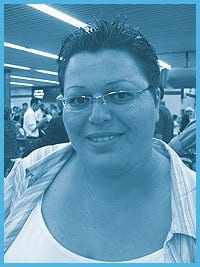Rauda Morcos is a true radical. She’s a Palestinian lesbian activist who next year plans to protest the Pride parade in Jerusalem.
“I’m against the idea of having a celebration at the same time that there’s occupation,” says Morcos, the 30-year-old coordinator of the first Palestinian lesbian group, Aswat. “We have people being killed 20 minutes down the road at the same time as this racist separation wall is being built,” she says, referring to the West Bank towns near Jerusalem that are frequently the site of clashes with the Israeli army and where Israel is building a controversial wall to cut itself off from the West Bank.
Morcos’ discomfort with Israeli Pride festivities is illustrative of the challenges she and other Aswat members face: they’re discriminated against as Palestinians living under Israeli rule, as women in a male-dominated society and as lesbians in an Arab community where there’s no official word for “gay.”
“We’re against any type of occupation,” she says. “I don’t want to be occupied as a Palestinian or as a woman or as a lesbian.”
Aswat was formed in 2003 by a group of women who wanted to add a Palestinian lesbian voice to the already thriving Israeli gay movement. The decision to restrict Aswat to women was not a deliberate political act.
“We wanted to find a way to break the silence that so many Palestinian lesbians face,” she says. “For this reason, it was important to bring women together in a safe place where they could talk about their own issues. It was natural.”
Today, Aswat has grown to 14 women who regularly meet as a group. They don’t have an office of their own, so they borrow space from organizations throughout Israel and meet in different cities so people from across the country can take part. The group has several members from the West Bank who have to cross several checkpoints to reach the meeting place and who legally aren’t even allowed in Israel. Other women from inside Israel face the challenge of explaining to their families where they’re going when they come to a meeting. In many Palestinian communities, women aren’t allowed out alone at night, let alone to travel to another city.
Morcos gave up her job as a teacher in order to become the full-time coordinator of Aswat. Just this year, the group got funding from three foundations, allowing it to start paying Morcos a salary. Currently, she is on a tour of several North American cities to promote her work and raise funds for Aswat. She’ll be in Toronto on Thu, Sep 30 for a poetry reading and reception at the Toronto Women’s Bookstore.
It’s clear that Morcos is overwhelmed by the pace of change she’s faced since becoming part of Aswat. “I know I’m leading this boat,” she says, “and I’m afraid because it’s a huge responsibility. But I also try to remember that I’m not doing this alone.”
She regularly gets stared and pointed at while she walks the streets of her small village in northern Israel, Kufer Yassis. She has also received several harassing phone calls at home. A big challenge is working with Aswat’s so-called allies. Many Israeli gay organizations, for example, are taken aback by Aswat’s strong anti-occupation stance while many Palestinian feminist organizations are afraid to embrace the dyke movement.
“We’re still speaking a language no one else is speaking,” says Morcos.
Morcos says it was tough at the beginning, with people shutting doors in her face.
“But I’m now at a point where I’ve stopped caring,” she says. “Some doors will shut, but then other ones will open. You just have to remind yourself that it’s all worth it because you’re doing something for women.”
* Rauda Morcos reads her poetry starting at 8pm on Thu, Sep 30 at the Toronto Women’s Bookstore (73 Harbord St). The free reading will be followed by a cocktail reception fundraiser for Aswat/Voices. The reception starts at 9:30pm at93 Harbord St. Tickets are $30 to $50 sliding scale, available in advance from the Toronto Women’s Bookstore.

 Why you can trust Xtra
Why you can trust Xtra


